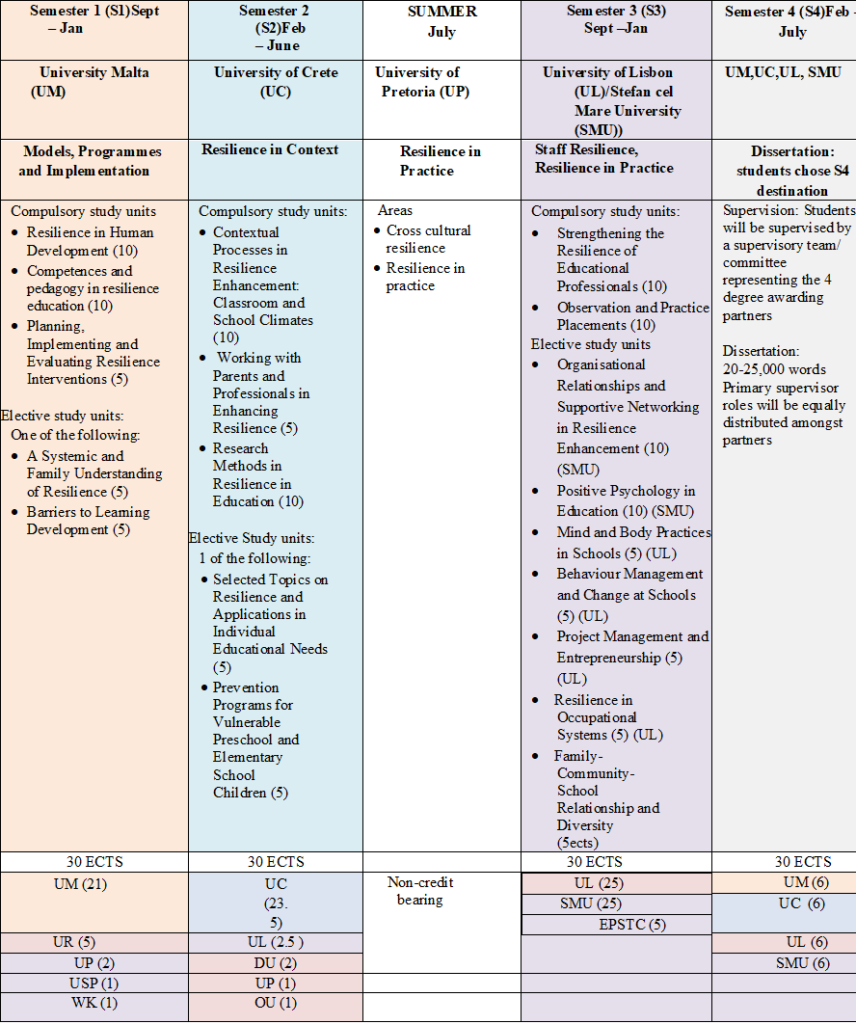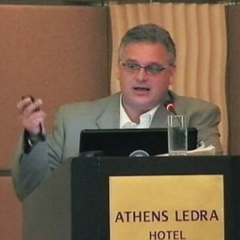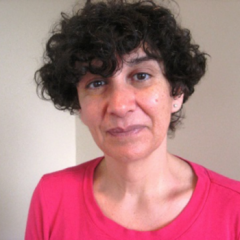The Erasmus Mundus Joint Master in Resilience in Educational Contexts -EMJM FLOURISH is a two-years’ full-time programme that seeks to address the need to provide a meaningful, relevant and balanced education for children growing up in adverse and marginalised circumstances, by focusing on their strengths and building their assets within protective contexts. It aims to build the capacity of educators and practitioners in creating resilience enhancing contexts which equip children and young people with the necessary resources and competencies to deal effectively with the challenges in their education and development.
The EMJM Resilience in Educational Contexts is offered by the University of Malta (leading partner) (P1), the University of Crete, Greece (P2); the University of Lisbon, Portugal,(P3) and Stefan Cel Mare University, Suceava, Romania (P4). The Programme is supported by six other associated partners, namely Dalhousie University, Canada; University of Rijeka, Croatia; University of Pretoria, South Africa, Orebro University, Sweden; University of Sao Paolo, Brazil, and the European School Psychology Training Centre.
The first cohort starts in October 2023 and then the group will be at the University of Crete in Spring Semester 2024. The student will do one at least more mobility to the other two universities in 2024. The last semester (dissertation) is online or face to face at one of the four universities. Language of instruction is English.
EMJM FLOURISH contains a curriculum of 120 ECTS spread over 4 full time semesters of 30 ECTS each. These include a number of compulsory taught study units, elective taught study units, a practice placement/internship, a dissertation, and an optional (zero credit) summer school. It incorporates the latest developments in the theory, research and practice of resilience in educational contexts, exposing students to a broad based, evidence informed, and multidisciplinary study of the field. The programme is informed by a systemic perspective to resilience, putting particular emphasis on how educational communities, in collaboration with families and other partners, may operate as resilience enhancing, inclusive social systems.
In the FIRST SEMESTER will be taught at the University of Malta, there will be a critical evaluation of the main theories of resilience in children and young people, the risk and protective factors for children and young people from marginalised contexts and the application of protective factors to promote resilience and wellbeing in different cultural contexts. Course participants will also be able to identify the key factors that influence programme implementation quality, adaptation to different contexts, and the practical use of experiential, collaborative and culturally responsive approaches in resilience education. There will be also a critical evaluation of the evidence on the effectiveness of resilience programmes for children and young people. Course participants will also choose from elective study units on systemic approaches to resilience, particularly the role of the family, and how to adopt culturally responsive resilience interventions and practices.
In the SECOND SEMESTER will be taught at the University of Crete. Greece and will be offered through the department of Preschool Education with the leadership of the School Psychology Research Unit with associates from Psychology department and other associates and collaborators. There will be a particular focus on the systemic and contextual processes underlying resilience, with a critical examination on how to create educational systems which promote academic and social-emotional resilience and wellbeing for all children in culturally responsive ways. The second semester also prepares students to engage in researching resilience with children and young people, addressing quantitative and qualitative methods of data collection and analysis as well as ethical issues when engaging in research and practice. This will be serve as preparation for the dissertation in semester 4. Course participants will also choose from elective study units on resilience in the early years and selected topics in the application of resilience in education.
In the more practice-based THIRD SEMESTER, course participants will be able to reflect on their own resilience and wellbeing and develop key competences in personal and social development. In the practice placement, they will observe educators and practitioners working with children and young people, and receive specialised training by professionals on crisis management and how to support the resilience of children and young people suffering from trauma. In the second part of the placement they will engage in a number of set tasks on how to put into practice the competences they have developed in the first two semesters, including universal programme implementation, targeted interventions, and working at systems level. Depending on their mobility, students will choose from a number of elective study units, including building supportive networks in promoting resilience, the application of positive psychology in education, mind and body practices in schools, behaviour management and change in schools, and project management and entrepreneurship. This semester will conjointly taught (with split student population) between the University of Lisbon (P3) and the San Stefan Cel Mare Suceava University, Romania (P4)
In the FOURTH SEMESTER, students will focus exclusively on the dissertation, where they will have the opportunity to apply the scientific approach to the study of a professional practice issue through primary data collection and analysis and the presentation of a 15,000 words dissertation. Students may do the fourth semester at one of the four Universities. The dissertation can be done independently, online, blended and face to face.
Students who complete the program successfully will be awarded a Joint Masters (M.A.) in Resilience in Educational Contexts, awarded conjointly by the University of Malta, University of Crete, Greece University of Lisbon, Portugal and Stefan Cel Mare University, Romania.
PROGRAMME OF STUDIES

Legend: The numbers in brackets denote the number of ECTS, 1 ECTS= 25 hours of student learning
In the SUMMER TERM between the first and second year of the programme, students will also have the opportunity to attend an optional SUMMER SCHOOL in South Africa observing various schools and services, besides attending a number of workshops.
NEW COURSE CODES FOR ERASMUS MUNDUS RESILIENCE IN EDUCATIONAL CONTEXTS SEMESTER 2 (UNIVERSITY OF CRETE, GREECE) (approved June 2023)
Obligatory Courses
1.Contextual and Systemic Process in Resilience Enhancement: Classroom
and School Climates (10 ECTS) UOC 1001
2. Research Methods in Resilience in Education. (10 ECTS) UOC 1002
3. Working with Parents and Professionals in Enhancing Resilience. (5 ECTS) UOC 1003
Electives Courses
4. Selective Topics in Resilience and Applications in Education (Elective) (5 ECTS) UOC 1004
5. Prevention Programs for Vulnerable Young children (Elective) (5 ECTS) UOC 1005
For more information:
https://flourishproject.mt/programme/career-prospects/
Erasmus Mundus Joint Master Degree in Resilience in Educational Contexts
EMJM FLOURISH has been accredited by the Hellenic Authority Higher Education (HAHE) ensuring its international quality.
PROF ANASTASSIOS, MATSOPOULOS, PhD,
UNIVERSITY OF CRETE, GREECE

Associate Professor of School Psychology and a bilingual permanently certified school psychologist in the US, Greece and Cyprus. He has considerable teaching, clinical and research experience in American School Psychology programs as well as experience in Europe in the areas of mental health, resilience and prevention programmes in schools. He has been involved in various EU and international projects in resilience education, well-being, teacher consultation, parent education and family resilience. Dr. Matsopoulos has numerous publications in resilience and socio-emotional health, he is the Acting President of the Hellenic Association of School Psychology (HASP) and currently he is faculty at the University of Crete in Greece and the ISPA Chair of the Interest group Parent Education and Family Resilience.
PROF SOFIA TRILIVA, PHD,
UNIVERSITY OF CRETE, GREECE

Sofia Triliva is a Professor at the University of Crete, Department of Psychology. Her research and publications have focused on the development and application of programming that bolsters the social and emotional competencies of youth and their communities. Along with esteemed colleagues, she has created, evaluated, and published both the empirical validation as well as the intervention protocols of seven handbooks of prevention and mental health promotion. They have been applied widely in schools, prevention centers, and communities in Greece and Cyprus.
